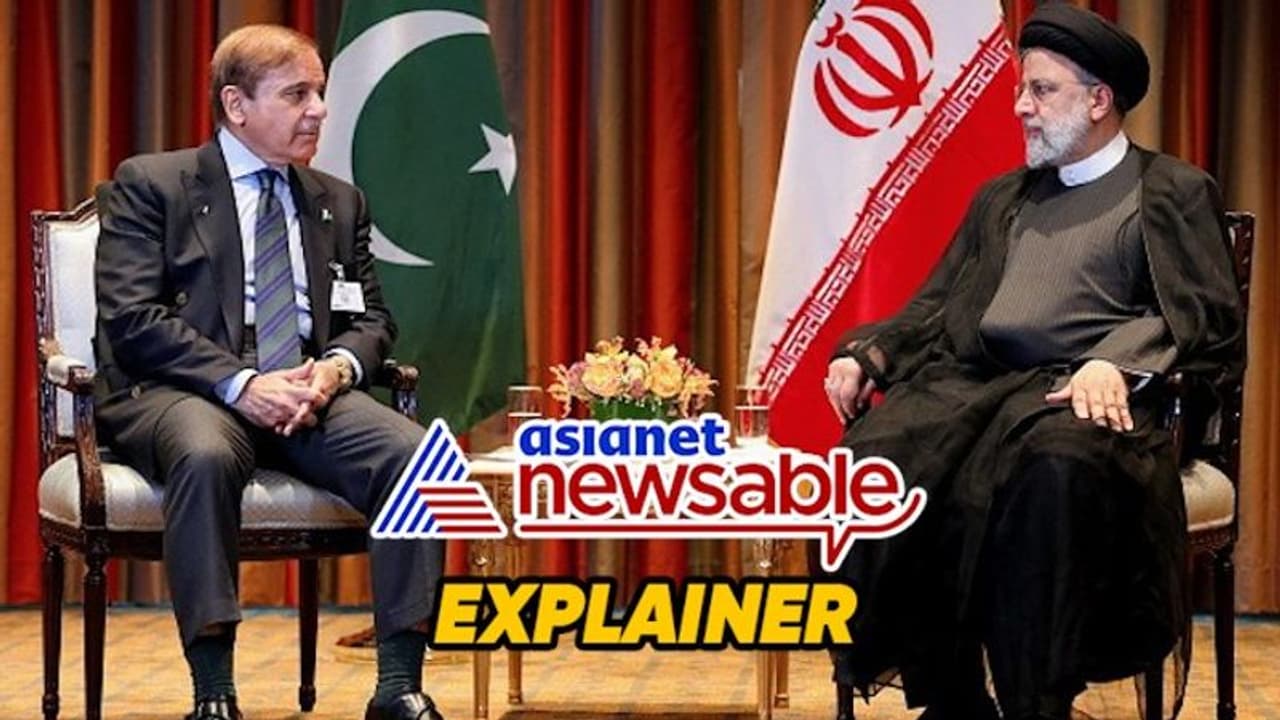After a period of heightened tensions marked by airstrikes between Pakistan and Islamabad, diplomatic efforts are underway as Iranian President Ebrahim Raisi on Monday embarked on a three-day visit to Pakistan aimed at bolstering bilateral ties.
After a period of heightened tensions marked by airstrikes between Pakistan and Islamabad, diplomatic efforts are underway as Iranian President Ebrahim Raisi on Monday embarked on a three-day visit to Pakistan aimed at bolstering bilateral ties. This visit comes after a recent cooling of tensions following airstrikes against alleged terrorist hideouts in each other's territories.

To provide context to the current diplomatic engagement, it's essential to examine the historical backdrop of the often tumultuous relationship between Iran and Pakistan.
A look at Iran-Pakistan's relations
Since Pakistan's formation in 1947, both nations have maintained bilateral ties. Notably, Iran was the first country to recognize the Islamic Republic of Pakistan after the Partition.
In 1979, following the Islamic Revolution in Iran, Islamabad reciprocated the gesture by becoming the first state to recognize the newly established Islamic Republic of Iran.
Despite this historical camaraderie, the relationship between the two countries, which share a 900-kilometre-long border, has been characterized by a mix of cordiality and tension, often punctuated by border skirmishes.
Several factors have contributed to the fluctuating nature of their relations. These include religious differences, divergent stances on issues such as the Taliban, challenges posed by the Baloch insurgency, occasional border skirmishes, Pakistan's close ties with the United States, and trade-related issues.
Religious differences between Iran and Pakistan
Both Iran and Pakistan, as members of the Organisation of Islamic Cooperation (OIC), share a common religious identity, which has historically strengthened their bilateral cooperation. Their alignment within the OIC has facilitated collaboration on significant issues affecting the Islamic world, such as the situations in Palestine, Iraq, and Kashmir, as highlighted in a 2024 paper titled “The tit-for-tat conflict between Iran and Pakistan, Strategic Comments”.
However, despite this shared religious identity, the Sunni-Shi’a divide has sometimes led to divergence between the two nations.
Following the secession of Bangladesh from Pakistan in 1971, Islamabad began to consolidate its national identity around Islam, a trend that intensified during the rule of Muhammad Zia-ul-Haq starting in 1977. In subsequent years, there was a notable shift towards emphasizing a Sunni identity for the nation, as outlined in the paper.
In contrast, Iran followed a different trajectory. After the 1979 Iranian Revolution, Shiism emerged as a central organizing force for the Iranian government. Consequently, the promotion and protection of Shi’a communities both domestically and internationally became significant priorities for Iran.
Conflicting stance on Afghanistan's Taliban
Tehran and Islamabad have frequently found themselves in disagreement regarding the situation in neighboring Afghanistan. During the Soviet occupation of Afghanistan in the 1980s, Saudi Arabia and Pakistan collaborated in confronting the Soviet Red Army while countering Iran's Shi’a-revolutionary Islam. This cooperation resulted in the emergence of an extremist Sunni current, influenced by radical Salafi and Wahhabi teachings, in the form of the Taliban.
Following the Taliban's rise to power in Afghanistan, Pakistan was among the few states to recognize their regime, whereas Iran supported the Northern Alliance. Additionally, Iran's strategic interests in Afghanistan often aligned with those of India, further deepening Pakistan's distrust.
A research paper titled “Ups and Downs in Iran-Pakistan Ties,” published in the Iranian Review of Foreign Affairs in 2012, highlighted the period of the Taliban’s first reign in Afghanistan, spanning from 1997 to 2001, as the lowest point in Iran-Pakistan relations.
During this time, bilateral trade exchanges between Iran and Pakistan plummeted to $166 million in 2001, compared to $394 million in 2000.
Islamabad's closeness to United States
After the 9/11 attacks, the United States assumed a dominant role in Afghanistan, which exacerbated tensions in Islamabad's relationship with Tehran. Pakistan's cooperation with the US during this period further strained its ties with Iran.
Pakistan attempted to navigate a delicate balance between its relationships with Tehran and Washington, notably illustrated by its handling of the Iran-Pakistan pipeline project. Initially agreed upon in 2014, the pipeline aimed to connect Iran and Pakistan. However, concerns over potential US sanctions hindered progress on Pakistan's part.
In a significant development, in December of the previous year, Iran issued a warning to Pakistan, threatening to pursue an international arbitration claim totaling US$18 billion if Pakistan failed to fulfill its commitment to complete its section of the pipeline.
Issue of insurgency in Balochistan
The restive Balochistan region poses challenges for both Pakistan and Iran, albeit for different reasons.
Leading the insurgency on the Iranian side of the border is Jaish al-Adl, a Sunni Islamist group with ties to ISIS. The Baloch insurgency in Pakistan is associated with a self-governing or independent Baluch state.
Both countries have accused each other of permitting their territory to be utilized for insurgent activities along their shared 900-kilometer border.
The latest strain in Pakistan-Iran relations, occurring in January 2024, is attributed to actions stemming from these allegations.
Recent strain in Iran-Pakistan relations
In January 2021, Tehran conducted airstrikes on suspected militant hideouts in Pakistan's Balochistan province, catching Islamabad by surprise. In retaliation, Pakistan deployed killer drones and rockets to target what it labeled as terrorist hideouts in Iran’s Sistan-Balochistan province. Tragically, both sides reported numerous civilian casualties resulting from the tit-for-tat attacks.
These incidents dealt a blow to the previously cordial relations between the neighboring countries. However, both sides swiftly engaged diplomatic channels to contain tensions. President Raisi's visit is anticipated to further bolster their ties.
What both nations hope from Raisi's visit
During President Raisi’s visit to Islamabad, the emphasis will be on enhancing the Pakistan-Iran relationship. The agenda includes discussions on enhancing cooperation in various sectors such as trade, connectivity, energy, agriculture, and fostering people-to-people contacts. Additionally, both sides will engage in dialogues concerning regional and global developments, as well as collaborating on bilateral efforts to combat the threat of terrorism.
